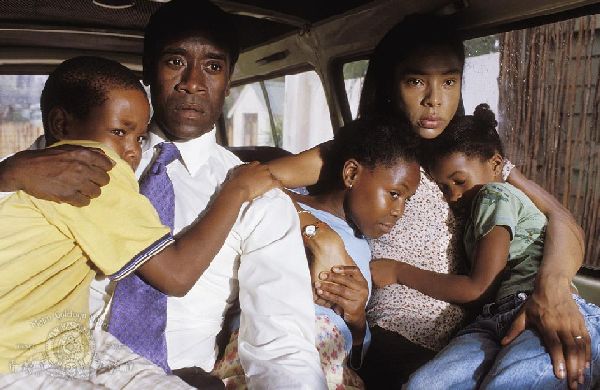Hotel Rwanda (2004) 
“When the world closed its eyes, he opened his arms.”

Director: Terry George
Cast: Don Cheadle, Sophie Okonedo, Joaquin Phoenix
Synopsis: The true story of Paul Rusesabagina, a hotel manager who housed over a thousand Tutsi refugees during their struggle against the Hutu militia in Rwanda.
Paul Rusesabagina, played here by Don Cheadle, is Rwanda’s answer to Oskar Schindler in that he apparently recued the lives of around 1200 fellow Rwandan’s during the brief and violent tribal war that followed the assassination of the country’s Prime Minister in 1994. Rusesabagina was the manager of the Hotel Sabena Hotel des Mille Collines, a plush hotel that catered to white holidaymakers and wealthy Africans. As the film opens, Rwanda is already a dangerous country in which rival tribal factions — Hutus and Tutsis — frequently clash. The hotel is seen as a haven from the troubles, thanks largely to Paul’s tireless manoeuvring. He greases palms, makes friends of volatile political and military leaders and, over a number of years, builds up a bank of goodwill upon which he is forced to rely when the tribal clashes escalate.
Despite its uplifting finale, Hotel Rwanda paints a pretty bleak picture of the human race. The war in Rwanda lasted only a matter of months but cost the lives of almost one million of its citizens. Most were Tutsis, but a number of Hutus who refused to participate in the madness were also slaughtered. The picture does well to show this turmoil without relying on bloody violence, and creates an absorbingly tense atmosphere in its first hour as we see social order rapidly destroyed and militant killers roaming the land and killing indiscriminately. Initially reluctant to become involved — ‘there is nothing we can do’ he shrugs as he and his Tutsi wife watch a neighbour beaten and bundled into the back of a truck by the militia one night — Paul’s inherent humanity prevents him from turning away any refugee that shows up at the hotel. Even when the world turns its back on the country, leaving it to an uncertain, but probably bloody, future, his determination never wavers despite the hidden fears that manifest themselves when he is alone.
Paul is an inspiring figure, and Don Cheadle gives his best screen performance to date in the role. He doesn’t play the part as a hero, but as a frightened man forced to rely on his wits despite being plagued by uncertainty and doubt. But in a role that reflects the impotence of the UN peacekeeping force, Nick Nolte has little to do but look surly or helpless as a well-meaning UN Colonel whose remit means he is incapable of offering any real protection to Paul, his family and the refugees. Sophie Ekonedo, as Paul’s loyal wife, is given the task of externalising the emotions that Paul keeps concealed and manages to negotiate the fine line between emotion and hysteria.
The performances of the principal cast go a long way to redeeming a plot that, although based on truth, too often descends into melodrama, especially in the last twenty minutes or so when director and writer Terry George (who co-wrote with Keir Pearson) insert a new dilemma every five minutes or so and engineer an emotional reunion with lost relatives that just doesn’t ring true. I don’t know how factual the story actually is — some claim Rusesabagina’s motives were, at least initially, more financial than altruistic, for example — but when the story starts resembling some by-the-numbers TV movie, the factuality of all that has gone before is inevitably brought into question. It’s a shame, because that first hour contains some powerful work.
httpv://www.youtube.com/watch?v=qZzfxL90100
